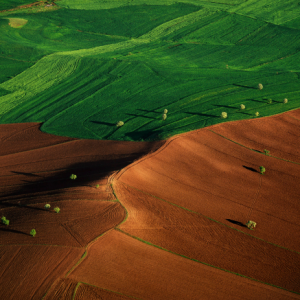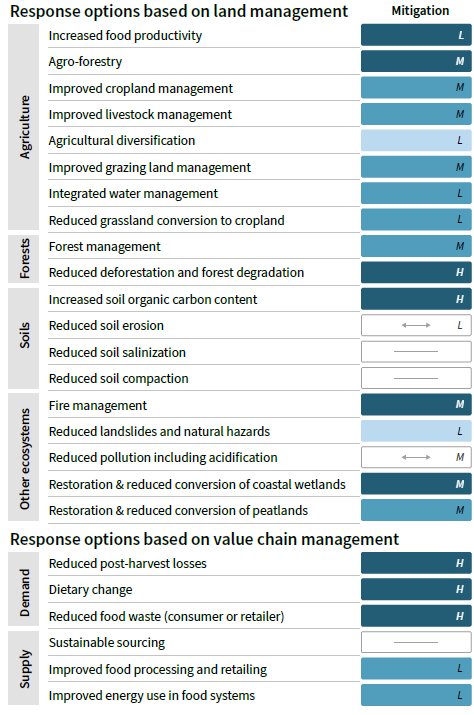Understanding the IPCC’s New Compendium of Science on Climate, Forests, and Farms
The Intergovernmental Panel on Climate Change (IPCC) published its long-waited Special Report on Climate Change and Land this morning. Written by 107 authors drawing on more than 7,000 scientific publications, the report is a complex compendium of scientific knowledge with a simple core message: to end climate change, we must eat less meat and waste less food.

For more on this subject, check out Episode 49 of the Bionic Planet Podcast, available on iTunes, TuneIn, Stitcher, or on this device here:
8 August 2019 | We eat to live, but the food we’re eating is killing us – not just because of what it does to our bodies, but because of what it does to our climate.
Beef, for example, comes from cows that burp out methane, which is a powerful greenhouse gas that traps up to 80-times more heat than carbon dioxide does, and we often chop carbon-absorbing forests to graze those methane-emitting cows, only to throw away one-third of all the food we produce.
If there are two things scientists who study this stuff agree on, it’s that we can slow climate change by eating less meat and wasting less food, according to the Intergovernmental Panel on Climate Change’s (IPCC) new Special Report on Climate Change and Land (SRCCL), which was published this morning in Geneva.

Climate-smart agriculture, which involves a range of supply-side activities like planting trees in among crops (agroforestry) and shifting to no-till farming and permaculture, is also critical for reducing emissions, the report says, but cautions that results gained from those activities will vary widely across regions, making them more difficult to quantify.
The report was compiled by 107 authors from 52 countries drawing on 7,000 peer-reviewed scientific papers and incorporating more than 25,000 comments. It doesn’t aim to offer new findings, but to provide a compendium of all known science related to the role that mankind’s management of forests, farms, and fields can play in meeting the climate challenge. It’s greatest value comes in presenting these findings in context and together, rather than in research silos.
The report is available for download in chunks on the IPCC web site (here is the direct link), and I recommend digesting it piecemeal, beginning with Chapter 1: Framing and Context. It’s the eighth chunk listed, but much more accessible than the first seven (they’ll make more sense after you read this one.)
Although it’s imossible to reduce such a massive body of work down into a few paragraphs, I’ll give it a shot with a few key take-homes here:
Better to Save Forests than to Plant Trees
While tree-planting efforts have garnered media attention this year, the report reiterates the consensus that planting trees will come to naught if we continue chopping existing forests. The Paris Climate Agreement contains provisions for financing forest conservation under mechanisms known as “REDD-plus,” which stands for “reducing emissions from deforestation and forest degradation, and the role of conservation, sustainable management of forests, and enhancement of forest carbon stocks.”
We Must Support Farmers and Indigenous People
Although diet emerges as king, the report also reminds us that we must support the indigenous people and forest communities who have long been among the best stewards of the land. Furthermore, we must help farmers, especially family farmers, who provide our food and manage our land, while engaging large agribusiness interests.
Within the Paris Agreement, the Koronivia Joint Work on Agriculture is where farmers engage the global process, and the Platform for Indigenous Peoples and Local Communities is where forest people engage the process.
We Must Restructure Global Supply Chains
The report makes it clear that global supply chains face tremendous risk, but offers no prescriptions for addressing it. While hundreds of commodity companies have pledged to reduce their impact on forests, research by the Supply Change initiative found that half of all companies with deforestatin risk aren’t addressing it.
Energy vs Food: Limited BECCS?
Finally, the report puts a damper on growing enthusiasm for bioenergy with carbon capture and storage (BECCS), which is a blend of new and old practices that use plant-based fuels to generate energy, but then use carbon capture technology to prevent the carbon dioxide from getting into the atmosphere. BECCS proponents say that cover crops, like switchgrass, and waste products, like corn husks, can provide the fuel needed without eating into food supplies, but the report identifies skepticism that such practices can be scaled up without impacting food supplies.
Please see our Reprint Guidelines for details on republishing our articles.

